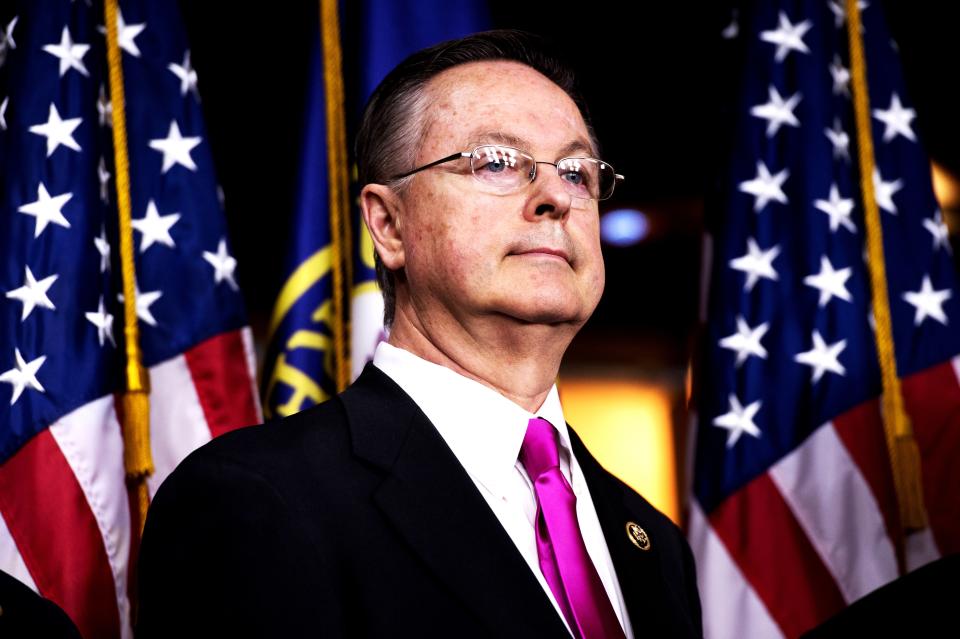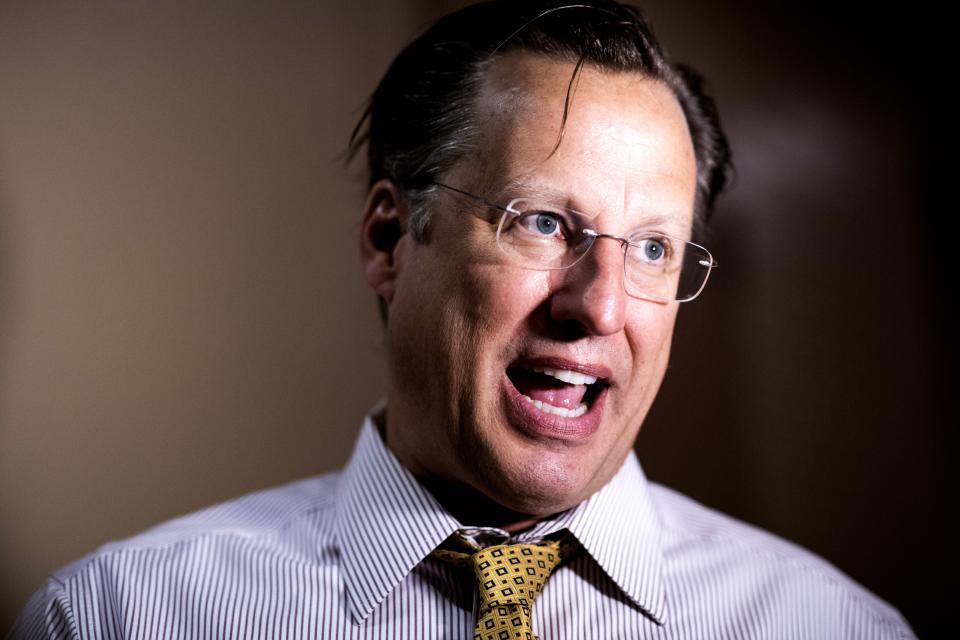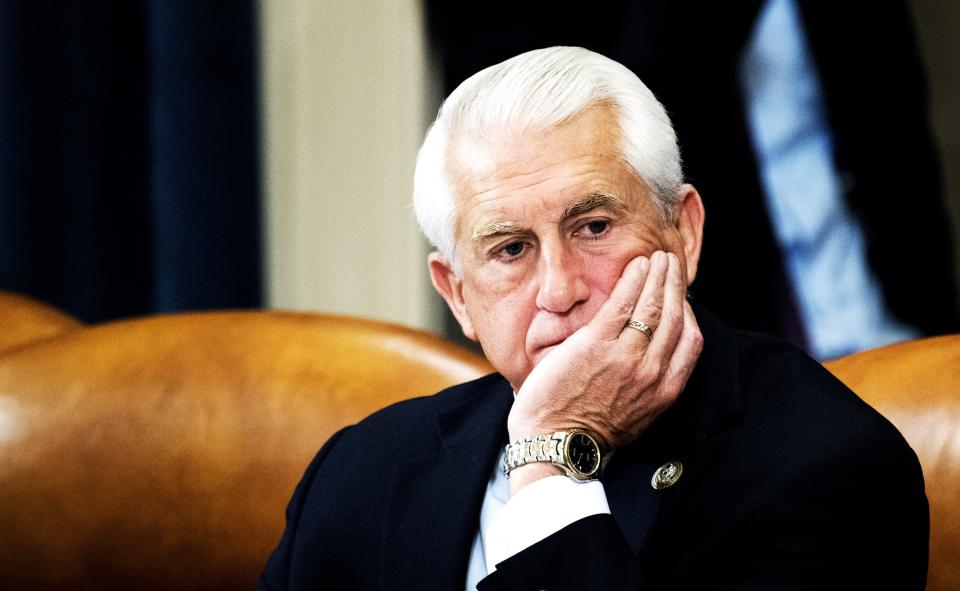How the Democrats Can Flip The House in the 2018 Midterm Elections, Part 4

Over the ten weeks between Labor Day and Election Day, as Democrats and Republicans battle it out for control of the House, we're taking a look at 30 of the most competitive races in the 2018 midterm elections: Where are these key districts, and what are they like? Which member is trying to keep their job? Who wants to take it away? And for whom might generous donations of your valuable time and hard-earned money make the greatest difference, if you were so inclined to make them? Democrats need to win only 23 seats to earn the gavel for the next two years, and nothing terrifies Donald Trump and friends more than what they plan to do with it.
For more elections coverage, you can read part one of this series here, part two here, and part three here, and a complete guide to the 2018 Senate races here.
Iowa 1st: The most relatable candidates in America are the ones with student debt

House Budget Presser
Tom Williams/Getty ImagesThe district: Northeast Iowa, east of I-35: Waterloo, Dubuque, and Cedar Rapids, which you may remember as the setting for an underrated 2011 Ed Helms movie of the same name. It's very white (98 percent!). It twice went for Obama by healthy margins, but flipped in 2016, when Trump won it by 3.5 points.
The incumbent: Republican Rod Blum, a climate science skeptic and Freedom Caucus doofus who just became the subject of the world's worst-timed House Ethics Committee investigation. When his membership in a Facebook group in which members posted racist content (the group is named "Tea Party"—imagine that) recently came to light, an AP reporter reached out to his office to follow up. Rod Blum got really, really mad about it.
You may also remember Blum from this 2017 interview in which he responded to an interviewer's question about why he screens attendees at his town halls by tearing off his microphone and storming out of the room, leaving the bewildered kids he had assembled around him as props just kind of standing there.
The NERVE of these JOURNALISTS, to ASK QUESTIONS of an ELECTED OFFICIAL about MATTERS OF PUBLIC CONCERN!
The challenger: Abby Finkenaeur, a 29-year-old state legislator who is still paying off her student loans. She's especially popular among unions thanks to her staunch advocacy for organized labor while serving in Des Moines. Her debut ad prominently features her welder dad literally wringing sweat out of a leather belt.
All politics is local: Iowa is one of the country's largest producers of soybeans, one of the products hit hardest by President Trump's various trade wars. (Experts have estimated that retaliatory Chinese tariffs could cost Iowan farmers $624 million.) This has not stopped Blum from thanking Trump, praising the president for showing "political courage" on the issue. As they always say in politics, anytime you can align yourself with an unpopular president whose policies are putting the squeeze on working-class voters whose support you'll need to fend off a formidable challenger, you have to do it.
Virginia 7th: Eric Brat is wearing out his welcome

Rep. Dave Brat
Bill Clark/Getty ImagesThe district: A swath of counties between Richmond and Charlottesville, bisected by I-64. A ton of Civil War battles happened here. It's about 17 percent black. If you're in the area, Culpeper is a lovely town.
The incumbent: College economics professor Dave Brat, who you may remember as the Tea Party upstart that beat then-House Majority Leader Eric Cantor in the district's Republican primary back in 2014, thanks in large part to the quiet efforts of a little-known media executive named Steve Bannon. In 2017, Brat griped about "paid activists" at his events and lamented that he couldn't hold town halls anymore because, as he put it, "The women are in my grill no matter where I go," which is a badge of honor for every one of his constituents who have decided not to put up with their representative's bullshit any longer.
The challenger: Abigail Spanberger, a former U.S. postal inspector and CIA operative who spent eight years abroad doing spy stuff before retiring in 2014. In a national security-heavy district—neither Langley nor Quantico are in it, but both are close by—this plays well. Like many first-time Democratic candidates this cycle, she's vowed not to accept corporate PAC money, and yet still maintains a slight edge over Brat in the fundraising race.
Time for some xenophobia: Earlier this year, thanks to an alleged clerical fuck-up, the Postal Service released an unredacted version (!) of Spanberger's security clearance application to an activist group working with Paul Ryan's super PAC. The agency apologized profusely, but the damage was done: The file revealed that in 2002, while waiting on her CIA background check, Spanberger worked as a substitute English teacher at the Islamic Saudi Academy, a now-closed private school in Fairfax County. A few students of its students went on to become involved in terrorism years after their periods of attendance.
There is not the slightest indication that Spanberger, who was waiting tables at the time and filled in at the school for a teacher on maternity leave, had anything to do with those students, and of course, that job didn't have any effect on the CIA's willingness to hire her. The Congressional Leadership Fund is populated exclusively by shameless hucksters, though, and so they cobbled together this bullshit:
To recap: Their brain-genius argument is that a woman who spent nearly a decade of her life fighting terrorism overseas is, in fact, a secret incubator of homegrown extremists whose candidacy poses a grave danger to the people of central Virginia. Might want to workshop that one a little more, guys.
Washington 8th: Wow, Republicans are still trying to make Dino Rossi happen?!

Tax Reform
Bill Clark/Getty ImagesThe district: Most of the suburbs east and south of Seattle, but also, all the towns along I-90 to the state's geographic center, and then north almost to the Canadian border. Lake Chelan is a poor man's Tahoe. The skiing is good. Mount Rainier is gorgeous for the 14 days per year when it's visible. Pretty wealthy—the average household income is just over $100,000—and about three-quarters white.
Also, I grew up in this district, and my parents still live there. More on them in a minute.
The incumbent: Dave Reichert, a former King County sheriff who helped catch the Green River Killer more than 20 years after the first of his 49 known murders, and then parlayed that bit of fame into what is now a 14-year career in Congress. He's one of a dozen Republicans who voted against Trumpcare, which is the type of thing that has enabled him to retain his seat in four straight presidential elections, including 2016, in which his party's candidate lost. Perhaps unwilling to press his luck any further, he announced his retirement in January.
The contenders: The Democrat is Kim Schrier, a pediatrician and first-time candidate who was inspired to run after growing frustrated with Reichert's reluctance to hold constituent town halls during the health care repeal debate last summer. She favors a public option, with the goal of "moving us toward" Medicare for All. Schrier advanced after a weird primary in which she won only 18.7 percent of the vote, thanks to three Democrats behind her split who an additional 31.5 percent between them. She'll need those supporters to turn out for her in November.
Her opponent is Dino Rossi, an off-and-on state senator who is now in his 15th consecutive year of failing to become the star for which the state's Republican Party always hoped. There is nothing Rossi loves more than losing statewide elections: for governor in 2004 and again in 2008, and then for U.S. Senate in 2010. Part of me is genuinely surprised that the party couldn't come up with anyone else off their bench to run in such a competitive contest.
On the issues, he recently told the Seattle Times that "it's not out of the question that human element can have an impact on the environment," but left it to the "scientists" to argue about the extent of that impact.
A personal story: Several weeks ago, while canvassing the neighborhood on a beautiful summer afternoon, Dino Rossi came face-to-face with none other than my 70-year-old father, who immediately recognized the Republican candidate standing on his doorstep. My dad votes for Democrats and is infuriated by Trump, but he is also the kind of person who prizes civility and decorum, and always sees the value in engaging with people, especially those with whom he disagrees, for the sake of The Discourse. Thus, he thanked Rossi for his time, but issued a quick disclaimer that he planned to back Schrier.
To this, Rossi replied: “So, you’re saying you want Nancy Pelosi to become the next Speaker of the House!”
This brand of unimaginative, reflexive fearmongering both surprised and amused my dad, who asked if that was really Rossi's pitch to voters. From there, he says, they went back and forth for awhile, debating the merits of the Affordable Care Act (my dad likes it; Dino doesn't), tax policy (there is no state income tax in Washington, which means public schools here never have any money), and that one time Rossi helped balance the state budget (in 2003). After ten minutes of what my dad happily describes as "a civil and mostly informed discussion," they exchanged head nods and agreed to respectfully disagree.
Or so he thought! Because as my dad closed the door, Rossi—while walking away, and without turning around—fired off a parting zinger: "I'm going to be your next representative. You'd better get used to it."
(A spokesperson for the Rossi campaign provided me with the following statement: "Dino has no memory of this particular interaction, but seriously doubts he said the last two sentences you quoted and I've never heard him say anything remotely close to that. The rest of the interaction you describe doesn't sound atypical to me.")
If this is how Dino Rossi addresses prospective constituents, all those Ls he’s absorbed over his career start to make a lot more sense.

